Redditor Is Pissed Off To Discover That The Dog Sitter Was Sleeping In Her Bedroom While She Was Out Of Town
When a dog's owner is gone, a dog sitter takes care of the pet. While following all directions from the dog owner, the dog sitter plans meals and exercise times for the dog.
Regular walks, feeding the dog on a schedule, transporting it to the vet if it becomes sick, and administering medication are all common dog-sitting responsibilities. Good dog sitters keep clients' dogs happy and healthy.
Dog owners want a dog sitter who offers excellent care for their dogs at a fair price. Therefore, pet owners frequently use pet sitters when they go on vacation, travel for business, work long hours, or are too ill or injured to care for their pets.
A good dog sitter communicates with the owners frequently and informs them right away if there is an emergency concerning the dog's health or welfare. Pet sitters often provide multiple visits per day, and some even offer overnight care.
In today's post, the OP shared that the lady who normally watches the kids for date nights offered to watch the dog so they did not have to board her. However, she discovered that the dog sitter had been taking food and drinks to her bedroom and sleeping there during the night and most of the day all weekend.
Keep scrolling to read the whole story in full.
The OP writes:

The OP discovered the dog sitter has been taking food and drinks to the bedroom
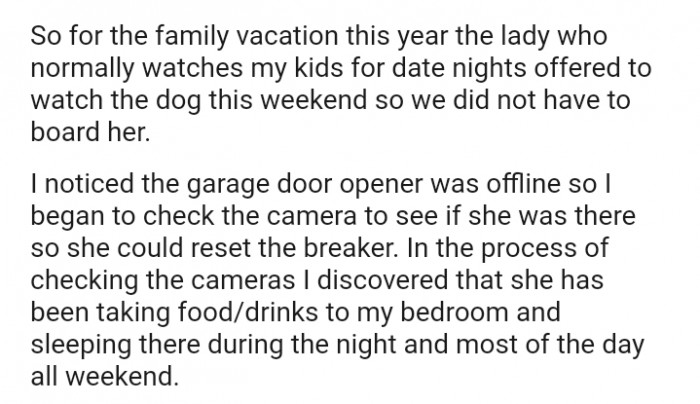
She has just decided to do whatever she wants

Trust and Boundaries in Caregiving
Trust is a fundamental component in any caregiving arrangement, and breaches of that trust can lead to significant emotional distress. Research in psychology emphasizes that when individuals hire caregivers or pet sitters, they are entrusting their personal belongings and loved ones to another person, which requires a high level of trust. According to Dr. Laura E. Davis, a clinical psychologist, breaches of trust can lead to feelings of vulnerability and betrayal.
Studies indicate that establishing clear boundaries and expectations can help mitigate these feelings and promote a more positive relationship between caregivers and clients.
The Importance of Trust in Caregiver Relationships
Dr. Anna Phillips, a clinical psychologist at the University of Chicago, emphasizes that trust is a vital component of caregiver relationships.
Her research indicates that breaches of trust can lead to feelings of betrayal and insecurity, impacting future interactions.
This situation highlights how the comfort level of caregivers can influence their professional conduct.
Here are some of the most upvoted comments from Redditors in response to the story.
She took it her way and you yours

Really?

This Redditor turned down a job that expected them to sleep on the couch

When issues arise in caregiving arrangements, open communication is crucial for resolving conflicts. Techniques such as regular check-ins can help ensure that both parties feel heard and respected. Research from the Journal of Applied Psychology shows that proactive communication can significantly enhance trust and satisfaction in caregiving relationships.
Furthermore, discussing expectations upfront can prevent misunderstandings and foster a sense of accountability for both the caregiver and the client.
This scenario reflects the psychological principle of boundary-setting, which is crucial for maintaining healthy relationships. According to Dr. Gary Chapman, a renowned marriage counselor, "Setting clear boundaries is essential for healthy relationships; it helps individuals express their needs and fosters mutual respect." Understanding and communicating these boundaries can prevent misunderstandings and foster healthier interactions, as emphasized by Dr. Michele Weiner-Davis, who states, "Boundaries are not walls; they are guidelines that help us navigate our interactions with others."
You define what it means to do the job

Did you expect her to sleep on the couch?

Humans do not have that ability

Navigating Feelings of Invasion of Privacy
Feelings of invasion of privacy can be particularly acute when someone enters one's personal space, such as a bedroom. According to research in social psychology, personal space is a critical aspect of individual comfort and security. Dr. Michelle J. Wilkins explains that boundaries around personal space must be respected to maintain psychological well-being.
When these boundaries are crossed, it can lead to feelings of discomfort and a loss of control, impacting the overall relationship between the caregiver and the client. Understanding these dynamics is essential for fostering trust and respect in caregiving situations.
Navigating Emotional Responses in Caregiving
Emotional responses can complicate caregiving relationships, particularly when personal boundaries are violated.
Research from the University of Virginia suggests that feelings of anger and betrayal can emerge when trust is broken, impacting the caregiver-client relationship.
Recognizing these emotions can empower individuals to set boundaries and communicate their needs more effectively.
That is something that should be communicated

It's totally up to her on how to handle the task

She assumed sleeping on the bed was okay

Understanding the emotional dynamics in caregiving can help individuals navigate complex situations more effectively.
Studies show that having open discussions about feelings and expectations can reduce tensions and foster understanding.
Encouraging honest communication can create a supportive environment where caregivers feel safe expressing their needs.
You weren't clear about your expectations or boundaries

Taking food in there was not appropriate
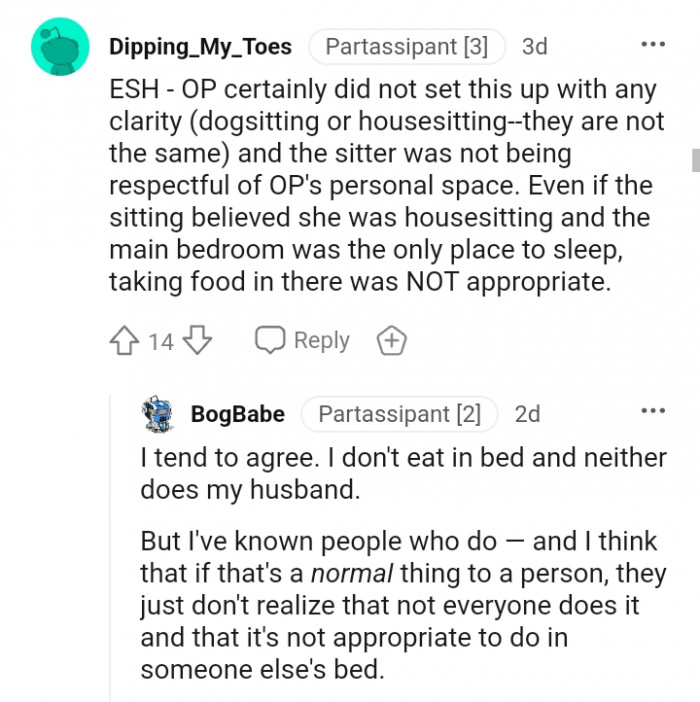
You have to set the expectation when you hire someone
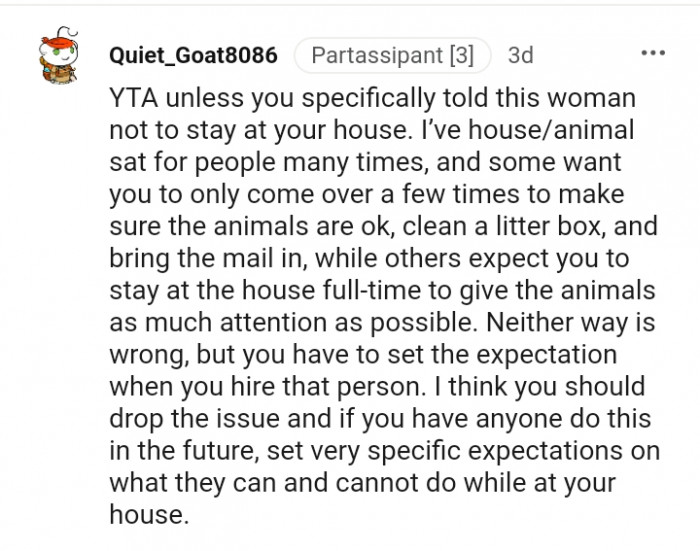
The Role of Self-Care in Caregiving
Self-care is essential for maintaining emotional well-being in caregiving roles.
Research indicates that caregivers who prioritize self-care are better equipped to manage stress and provide effective support.
Practicing mindfulness and engaging in activities that bring joy can enhance resilience and prevent burnout.
Why was your arrangement so vague?
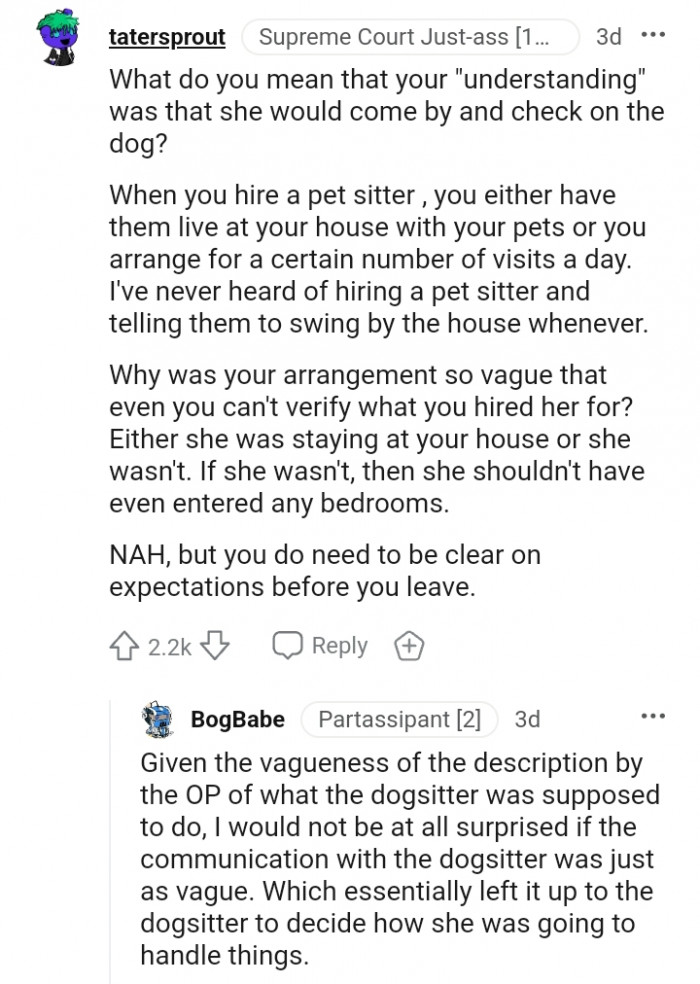
She's essentially staying there while you're gone

You don't say anything about paying her for this

When faced with difficult situations, seeking external support, such as counseling or talking to trusted friends, can provide clarity and help individuals navigate complex emotional landscapes.
Research suggests that having an objective perspective can enhance problem-solving and emotional regulation.
Encouraging open discussions about feelings and boundaries can create a pathway for healthier relationships.
You can't just drop in and feed them twice a day

The OP was unclear about the expectations

This is disrespectful to someone else's living space
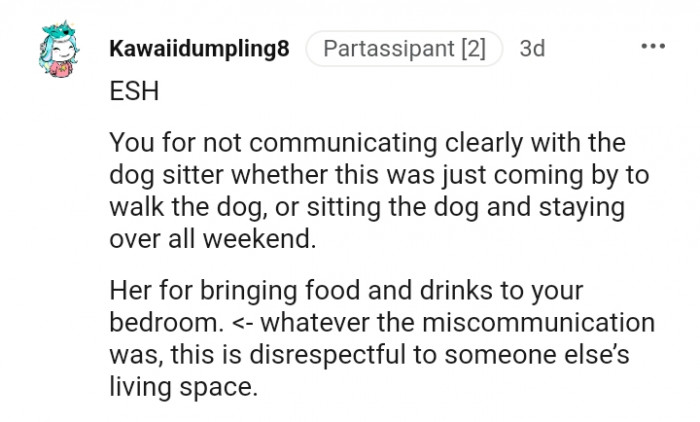
Understanding the Impact of Past Experiences
Past experiences often shape current emotional responses, particularly in caregiving relationships.
A study from Yale University highlights how unresolved issues can manifest in caregiver-client dynamics, leading to recurring patterns of conflict.
Recognizing these patterns can empower individuals to break the cycle and foster healthier interactions.
Unless you had a formal agreement on where she would sleep

She doesn't want anyone else put out

Pet sitting is the act of caring for a pet in its own home while the owner is away. One has to discover the preferred walking routes for the dogs and come up with entertaining techniques to keep them engaged, among other things.
Not much information was provided as to whether the dog sitter did her job or not, but the OP seems upset that the dog sitter made herself too comfortable.
Engaging in professional development opportunities can enhance skills in boundary-setting and emotional regulation.
Research indicates that ongoing training can improve emotional intelligence and foster healthier caregiver relationships.
Encouraging open dialogue about feelings and experiences can help individuals reconnect and strengthen their professional bonds.
Psychological Analysis
This situation exemplifies the emotional complexities that arise in caregiver relationships. Recognizing the importance of trust and boundaries can help individuals engage more constructively and develop healthier dynamics.
Encouraging open communication and self-care is essential for maintaining effective caregiving relationships.
Analysis generated by AI
Analysis & Alternative Approaches
Navigating caregiver relationships can be complex and emotionally charged. When individuals approach these situations with empathy and open communication, they can foster healthier dynamics and break negative cycles.
Setting boundaries, seeking support, and understanding past experiences are essential strategies for navigating these challenges.
Analysis & Alternative Approaches
In conclusion, maintaining trust and respect in caregiving arrangements is essential for both parties. Open communication and clearly defined boundaries can help prevent misunderstandings and breaches of trust. Research supports the notion that fostering positive relationships in caregiving settings requires attention to individual comfort and respect for personal space.



